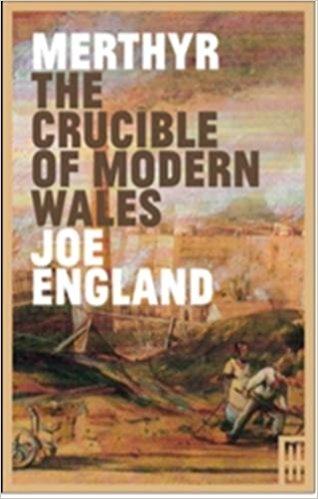Mario Basini reviews Merthyr: The Crucible of Modern Wales by Joe England, an engaging historical account of industrial-era Merthyr.
Far from overstating its case, the title of Joe England’s new book, Merthyr, The Crucible of Modern Wales, undervalues the contribution that remarkable town made to the development of the industrial world beyond the nation it helped to shape. True, many of the themes which distinguished industrial Wales were forged in Merthyr Tydfil in the years covered by the book, 1760 to 1912. An economy based on iron and steel, railways, religious and political radicalism, the emergence and eventual domination of the Labour Party, choral singing and brass bands, even journalism in English and Welsh, began or were developed there. But the technological advances embodied in its four great ironworks, especially those at Dowlais and Cyfarthfa, made them a model which pioneers of iron industries across the globe strove to imitate.
In America, France and Russia they saw the integrated manufacturing processes of the Merthyr works as blueprints they should follow. Workers from the town flocked abroad to show the natives how it should be done. Merthyr’s top quality steam coal fuelled vessels from paddle steamers plying the Thames to the great warships that made the British navy the most powerful in the world.
The town played a crucial part in the creation of another ingredient crucial to the Industrial Revolution. Trevithick’s locomotive tested at Penydarren in 1804 helped to develop the transport system needed for the modern world to flourish. Methyr’s ironworks produced millions of tons of rails that carried the successors of Trevithick’s great experiment across the globe, from the United States’s prairies to the Siberian steppes.
Joe England, another in the rich crop of professional historians produced by Merthyr since World War II, tells this astonishing story in an attractive prose made dense by the detail of his research. The book does justice to its great subject. At its heart lies his challenge to what he says has become the orthodox reading of Merthyr’s industrial history which sees it as uninterrupted progression of working class radicalism from the riots of 1800, 1816 and 1831 to the election of Keir Hardie as the town’s first Labour MP in 1900.
That view, says the author, ignores the major part played in the development of Merthyr’s radicalism by members of its small but highly influential artisan and professional class who led the fight for parliamentary reform, for better local government and for the establishment of a Public Health Act desperately needed in a town where the lack of sanitation meant streets filled with noisome filth and epidemics of killer diseases. Radical nonconformity with its emphasis on sobriety and self-help also shaped Merthyr’s politics, even if its influence was tempered by the riotous, bawdy excesses produced by the town’s 500 or so public houses.
However, Joe England’s thesis fails to convince. Granted the lead in the battles for parliamentary and civic reform and for better housing and working conditions was taken by the middle classes, many of whom were self-employed and less economically dependent on the ironmasters. How could it be otherwise in a society where the working man depended entirely for his and his family’s existence on a group of ironmasters, backed by the power of the state, who were ruthlessly determined to defend their interests and their profits at all costs? Even if their interests did not always coincide, the major beneficiaries the reforms fought for by the weavers, the lawyers and publicans of Merthyr remained its ironworkers and colliers. In that sense the fight for radical reform was indeed a working-class movement.
The author makes much of the “oasis of industrial calm” which followed the defeat of the Chartists in the attack on Newport in 1839 and which lasted until the 1870’s. That in itself is contentious.
There was, as Joe England acknowledges, at least one major industrial dispute in Merthyr that time and there could have been others not recorded because collecting statistics on strikes only began in 1888. Social unrest triggered by the economic conditions continued in that period. In Dowlais in 1850, for example, riots between Welsh workers and the Irish blamed for stealing Welsh jobs, raged for three days. The police when they intervened were pelted with huge stones.
An accord in which the workers recognised the right of the ironmasters to impose often swingeing cuts in wages when the price of iron fell helped to create industrial peace, says Joe England. Many never subscribed to that accord.
A dispute in 1853 with the Dowlais company’s miners resulted in the owner, Lady Charlotte Guest, locking them out for six weeks, an outcome largely attributed by Joe England to her lack of managerial experience.
The novelist Jack Jones, himself a miner who began work underground at 12 years old , recalled the bitterness the strike engendered which resonated for decades. In his magnificent autobiography, Unfinished Journey, he wrote , “Unconditional surrender was what she (Lady Charlotte) demanded. As bad as old (Richard) Crawshay himself she was. Now they (the ironmasters) were gone…. to live in their parks at Caversham and Wimbourne, leaving their old puddlers with constitutions ruined by too much hard work, drinking and insanitary home life, to fill workhouses and fatten graveyards.”
This book is published by Parthian and is available from their website.











